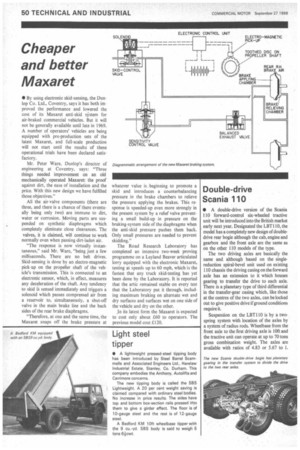Cheaper and better Maxaret
Page 52

If you've noticed an error in this article please click here to report it so we can fix it.
• By using electronic skid-sensing, the Dunlop Co. Ltd., Coventry, says it has both improved the performance and lowered the cost of its Maxaret anti-skid sYstem for air-braked commercial vehicles. But it will not he generally available until late in 1969. A number of operators' vehicles are being equipped with pre-production sets of the latest Max aret, and full-scale production will not start until the results of these operational trials have been declared satisfactory.
Mr. Peter Ware. Dunlop's director of engineering at Coventry, says: "Three things needed improvement on an old mechanically operated Maxaret: the proof against dirt, the ease or installation and the price. With this new design we have fulfilled those objectives."
All the air-valve components (there are three, and there is a chance of there eventually being only two) are immune to dirt, water or corrosion. Moving parts are suspended on synthetic diaphragms which completely eliminate close clearances. The valves, it is claimed, will continue to work normally even when passing dirt-laden air.
"The response is now virtually instantaneous," said Mr. Ware, "being just a few milliseconds. There are no belt drives. Skid-sensing is done by an electro-magnetic pick-up on the propeller shaft of the vehicle's transmission. This is connected to an electronic sensor, which, in effect, measures any deceleration of the shaft. Any tendency to skid is sensed immediately and triggers a solenoid which passes compressed air from a reservoir to, simultaneously_ a shut-off valve in the main brake line and the back sides of the rear brake diaphragms.
"Therefore, at one and the same time, the Maxaret snaps off the brake pressure at whatever value is. beginning to promote a skid and introduces a counterbalancing pressure in the brake chambers to relieve the pressure applying the brakes. This response is speeded-up even more strongly in the present system by a relief valve preventing a small build-up in pressure on the braking-system side of the diaphragms when the anti-skid pressure pushes them back. Only small pressures are needed to prevent skidding."
The Road Research Laboratory has completed an intensive two-week proving programme on a Leyland Beaver articulated lorry equipped with the electronic Maxaret, testing at speeds up to 60 mph, which is the fastest that any truck skid-testing has yet been done by the Laboratory. It is reported that the artic remained stable on every test that the Laboratory put it through, including maximum braking on alternate wet and dry surfaces and surfaces wet on one side of the vehicle and dry on the other.
,In its latest form the Maxaret is expected to cost only about £60 to operators.. The previous model cost £120.
































































































































































































